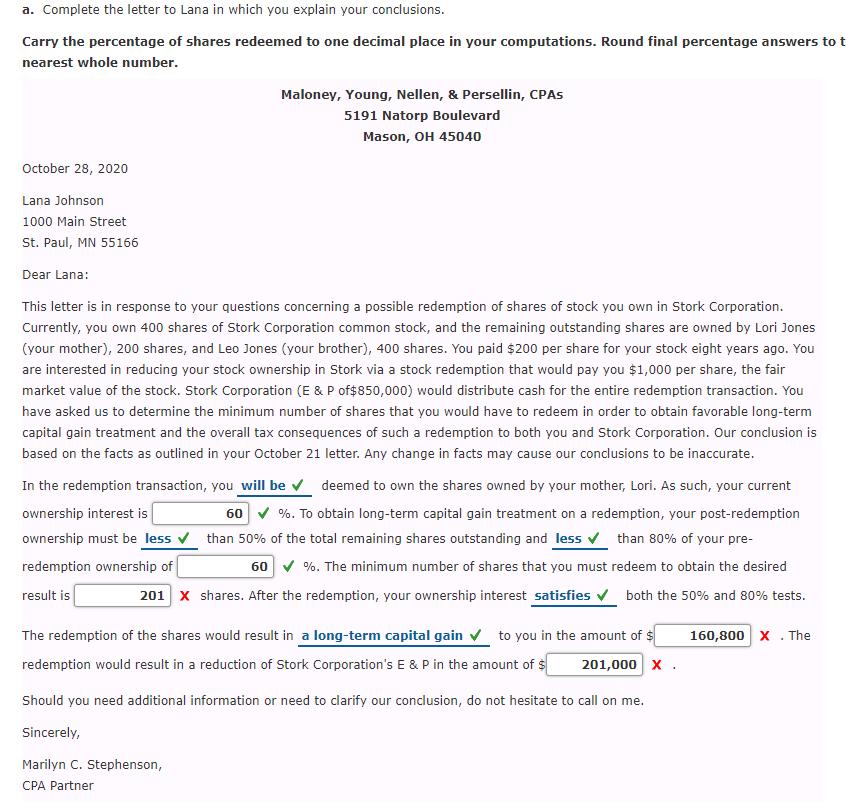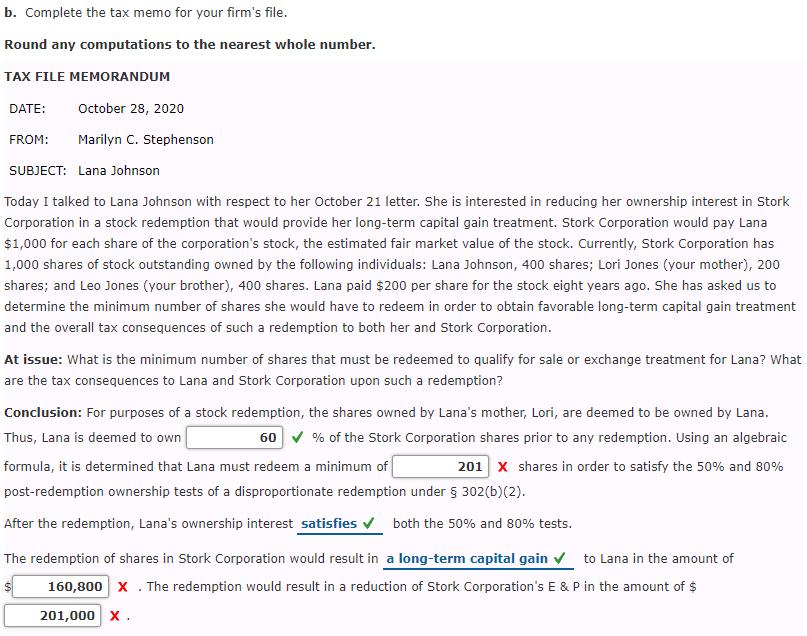Answered step by step
Verified Expert Solution
Question
1 Approved Answer
Stork Corporation (E & P of $850,000) has 1,000 shares of common stock outstanding. The shares are owned by the following individuals: Lana Johnson,



Stork Corporation (E & P of $850,000) has 1,000 shares of common stock outstanding. The shares are owned by the following individuals: Lana Johnson, 400 shares; Lori Jones (Lana's mother), 200 shares; and Leo Jones (Lana's brother), 400 shares. Lana paid $200 per share for the Stork stock eight years ago. Lana is interested in reducing her stock ownership in Stork Corporation via a stock redemption for $1,000 per share, the fair market value of the stock. Stork Corporation would distribute cash for the entire redemption transaction. In late October, Lana inquired as to the number of shares she would have to redeem in order to obtain favorable long-term capital gain treatment and the overall tax consequences of such a redemption to both her and Stork Corporation. a. Complete the letter to Lana in which you explain your conclusions. Carry the percentage of shares redeemed to one decimal place in your computations. Round final percentage answers to t nearest whole number. Maloney, Young, Nellen, & Persellin, CPAS 5191 Natorp Boulevard Mason, OH 45040 October 28, 2020 Lana Johnson 1000 Main Street St. Paul, MN 55166 Dear Lana: This letter is in response to your questions concerning a possible redemption of shares of stock you own in Stork Corporation. Currently, you own 400 shares of Stork Corporation common stock, and the remaining outstanding shares are owned by Lori Jones (your mother), 200 shares, and Leo Jones (your brother), 400 shares. You paid $200 per share for your stock eight years ago. You are interested in reducing your stock ownership in Stork via a stock redemption that would pay you $1,000 per share, the fair market value of the stock. Stork Corporation (E & P of $850,000) would distribute cash for the entire redemption transaction. You have asked us to determine the minimum number of shares that you would have to redeem in order to obtain favorable long-term capital gain treatment and the overall tax consequences of such a redemption to both you and Stork Corporation. Our conclusion is based on the facts as outlined in your October 21 letter. Any change in facts may cause our conclusions to be inaccurate. In the redemption transaction, you will be deemed to own the shares owned by your mother, Lori. As such, your current ownership interest is 60%. To obtain long-term capital gain treatment on a redemption, your post-redemption ownership must be less than 50% of the total remaining shares outstanding and less than 80% of your pre- redemption ownership of 60 %. The minimum number of shares that you must redeem to obtain the desired result is 201 X shares. After the redemption, your ownership interest satisfies both the 50% and 80% tests. The redemption of the shares would result in a long-term capital gain to you in the amount of $ redemption would result in a reduction of Stork Corporation's E & P in the amount of $ 201,000 X. Should you need additional information or need to clarify our conclusion, do not hesitate to call on me. Sincerely, Marilyn C. Stephenson, CPA Partner 160,800 X. The b. Complete the tax memo for your firm's file. Round any computations to the nearest whole number. TAX FILE MEMORANDUM DATE: October 28, 2020 FROM: Marilyn C. Stephenson SUBJECT: Lana Johnson Today I talked to Lana Johnson with respect to her October 21 letter. She is interested in reducing her ownership interest in Stork Corporation in a stock redemption that would provide her long-term capital gain treatment. Stork Corporation would pay Lana $1,000 for each share of the corporation's stock, the estimated fair market value of the stock. Currently, Stork Corporation has 1,000 shares of stock outstanding owned by the following individuals: Lana Johnson, 400 shares; Lori Jones (your mother), 200 shares; and Leo Jones (your brother), 400 shares. Lana paid $200 per share for the stock eight years ago. She has asked us to determine the minimum number of shares she would have to redeem in order to obtain favorable long-term capital gain treatment and the overall tax consequences of such a redemption to both her and Stork Corporation. At issue: What is the minimum number of shares that must be redeemed to qualify for sale or exchange treatment for Lana? What are the tax consequences to Lana and Stork Corporation upon such a redemption? Conclusion: For purposes of a stock redemption, the shares owned by Lana's mother, Lori, are deemed to be owned by Lana. Thus, Lana is deemed to own 60% of the Stork Corporation shares prior to any redemption. Using an algebraic formula, it is determined that Lana must redeem a minimum of 201 X shares in order to satisfy the 50% and 80% post-redemption ownership tests of a disproportionate redemption under 302(b)(2). After the redemption, Lana's ownership interest satisfies both the 50% and 80% tests. The redemption of shares in Stork Corporation would result in a long-term capital gain to Lana in the amount of 160,800 X. The redemption would result in a reduction of Stork Corporation's E & P in the amount of $ 201,000 X.
Step by Step Solution
★★★★★
3.43 Rating (159 Votes )
There are 3 Steps involved in it
Step: 1

Get Instant Access to Expert-Tailored Solutions
See step-by-step solutions with expert insights and AI powered tools for academic success
Step: 2

Step: 3

Ace Your Homework with AI
Get the answers you need in no time with our AI-driven, step-by-step assistance
Get Started


